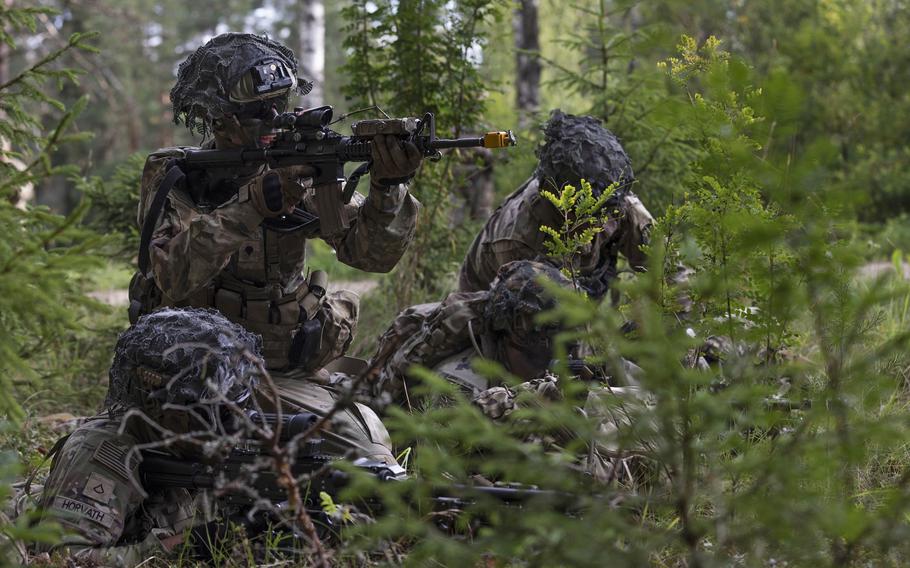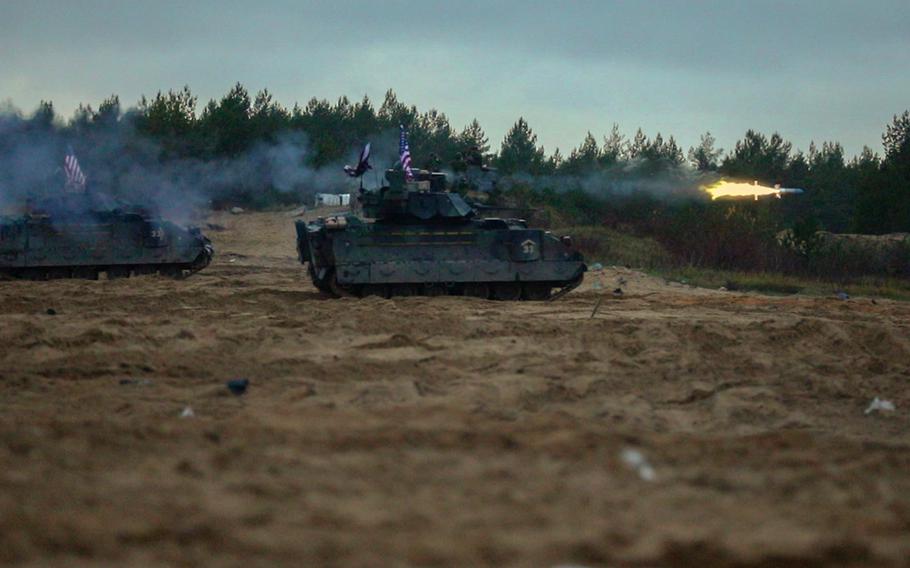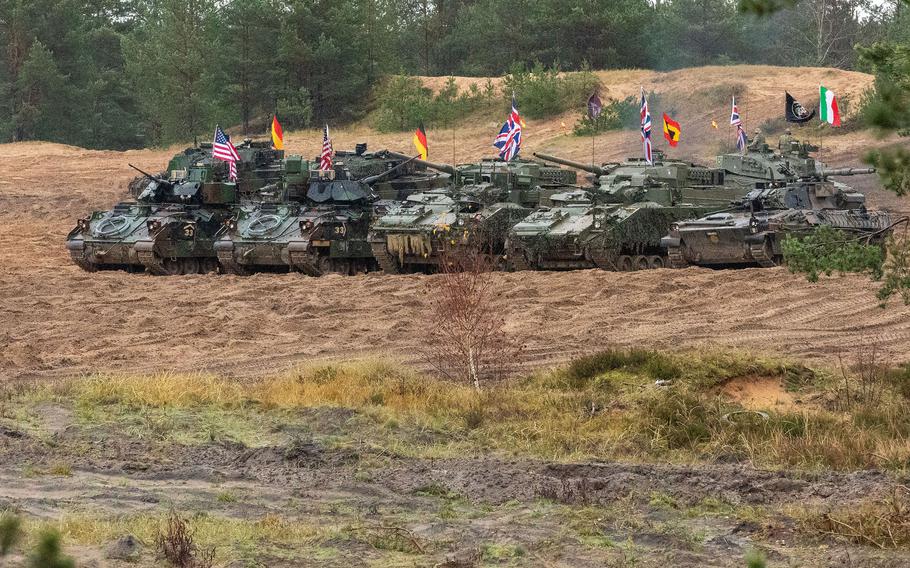
Soldiers from the 101st Airborne Division return fire during a platoon-level exercise at Nurispalu Training Area, Estonia, June 25, 2023. (Oscar Gollaz/U.S. Army)
STUTTGART, Germany — Russia’s battlefield losses in Ukraine have eliminated the military advantages it once held over NATO allies in the Baltic region, a new think tank report says.
“Russia has effectively lost its position of power and the capacity to threaten its neighbors with projections of military power,” Pavel Baev wrote in a November report for the French Institute of International Relations.
Baev, a longtime Russia expert who once worked at a research institute inside the Soviet Union’s defense ministry, argues many Western policy planners haven’t grasped the long-term implications of what the war in Ukraine means for security in the Baltics.
While some in the West see Russia’s weakened position as transitional and a Russian comeback inevitable, Moscow sees the loss of its conventional military edge in the Baltics as “both unacceptable and irreversible,” Baev said.
The Baltic nations of Estonia, Latvia and Lithuania were annexed by the Soviet Union during World War II. Since becoming independent in the 1990s, their forces always have been far smaller and less developed than Russia’s.
However, they have welcomed training with U.S. troops and other NATO allies, which are required to collectively defend the Baltic nations if they are attacked, in line with the alliance’s treaty.

Soldiers from 2nd Armored Brigade Combat Team, 3rd Infantry Division, fire missiles during exercise Iron Spear in Adazi, Latvia, Nov. 13, 2023. Since Russia's initial invasion of Ukraine in 2014, NATO has added multinational battlegroups in the Baltics and Poland, and ramped up rotations of other combat forces in the region. (Bernabe Lopez III/U.S. Army)
Russia’s war in Ukraine has taken an extreme toll on its military and challenges its ability to maintain a large force on its western flank with NATO, the report said. The study argues that Moscow’s strategic goal of turning its military exclave of Kaliningrad into a launching pad to dominate the central part of the Baltic region “has effectively been canceled.”
Moreover, Ukraine’s ability to target Russian military infrastructure around Crimea has exposed weaknesses in Russia’s coastal defense weapon systems. Those vulnerabilities also apply to the Russian military along the Baltic coast.
Beyond the tactical weaknesses, Russian capabilities were compromised as assets moved to the war front. Many of the Baltic units tasked with guarding Russia’s western border with NATO countries have been decimated during the nearly two years of fighting in Ukraine, according to the report, which cites a lengthy list of damaged units.
“Whatever the scope of the outcome of the war, Russia will not be able to rebuild a position of military superiority in the Baltic theater or even to set an approximate balance of forces with NATO, which is implementing a new plan to strengthen its posture in this reconfigured direction,” Baev said.
Moscow could be forced to rely more on long-range missiles and talk up its nuclear capability for deterrence purposes, to make up for its conventional military disadvantages.

Troops from Germany, Italy, the Netherlands, the U.K. and the U.S., assigned to NATOs enhanced Forward Presence Battle Group Poland, stage their vehicles before a firepower demonstration in Adazi, Latvia, Nov. 13, 2023. (U.S. Army)
“Plain strategic logic dictates that weakness of conventional forces necessitates greater reliance on nuclear capabilities, and the Baltic theater may see applications of this logic,” the report says.
Regardless of the outcome of the war, Russia also will need to position forces along its southern border with Ukraine for the long-haul, the report says.
For years, the Baltics have been a focal point for the American-led NATO alliance, which has strengthened its position in the region amid concerns that it was outgunned by Russia. Many of the alliance’s changes were prompted by Russia’s initial 2014 intervention in Ukraine, which shattered old post-Cold War assumptions about a more secure Europe.
In the years before 2014, many NATO militaries drastically reduced defense spending, shrunk the sizes of their militaries and regarded the prospect of large-scale conflict on the European continent as an anachronism.
The U.S. military also sharply scaled back on the Continent, removing the last of its battle tanks from Europe just months before Russia’s annexation of Ukraine’s Crimean Peninsula.
The diminished NATO force prompted angst among security analysts at the time. Those concerns were reinforced by a large war game, carried out by the Rand Corp. think tank with the assistance of numerous American military commands between 2014 and 2015.
It found a Russian offensive in the Baltics would overwhelm lesser-armed alliance forces and seize the Estonian and Latvian capitals in a matter of hours.
The Rand war game, which garnered much attention at the time, said “the outcome was, bluntly, a disaster for NATO.”
Since then, NATO has added multinational battlegroups in the Baltics and Poland and ramped up rotations of other combat forces in the region, including U.S. Army tank units.
That, along with the addition of Finland into NATO and eventually Sweden, tipped the balance in the Baltics to NATO’s favor, Baev said.
“With the accession of Finland and Sweden to NATO, the Baltic theater is reconfigured so profoundly to Russia’s disadvantage that no amount of effort could make ‘Fortress Kaliningrad’ defensible,” the report said.